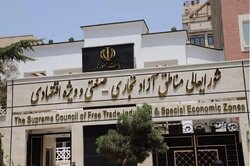
Investment deals worth over €2.5b signed in 7 free zones

The lands for the implementation of the investment projects have also been given to the investors, the secretariat stated.
Back in December 2023, the secretary of Iran’s Free Zones High Council said that 1,000 investment packages worth nine quadrillion rials (about €20 billion) have been prepared to be offered to investors in the country’s free and special economic zones.
Speaking to the press on the sidelines of the Second Eurasian Economic Union (EAEU) Exclusive Exhibition in Tehran, Hojatollah Abdolmaleki said: “The preparation of investment projects to introduce the country’s free and special economic zones to international economic operators and investors was put on the agenda since the beginning of the current [Iranian calendar] year (late March 2023).”
“Investment projects are considered as a tool to introduce the opportunities and advantages of investment in the country’s free and special economic zones to the economic operators. The preliminary studies of each of these projects have been done, the infrastructure has been provided and the necessary licenses have been issued,” Abdolmaleki explained.
According to the official, the mentioned investment packages have been unveiled in four stages since the beginning of the current Iranian calendar year, the last of which worth 2.5 quadrillion rials (about $5.0 billion) was presented in the EAEU exclusive exhibition.
The secretary of the Free Zones High Council emphasized that these zones are considered poles of economic progress, adding: “Free and special economic zones are frontiers of the country's international economy, and more than a third of the country’s non-oil exports were done from these zones.
The establishment of free trade zones (FTZs) in Iran dates back to the Iranian calendar year 1368 (March 1989 - March 1990) following the fall in the country’s oil income in the preceding year which prompted the government to promote non-oil exports.
The first two free trade zones of Iran were established in the south of the country. The first one was Kish Free Trade Zone established in 1368 on Kish Island in the Persian Gulf and the second one was Qeshm Free Trade Zone established the year after on Qeshm Island in the Strait of Hormuz.
Some five other free trade zones have been also established in the country since then, including Chabahar in southeastern Sistan-Baluchestan Province, Arvand in southwestern Khuzestan Province, Anzali in northern Gilan Province, Aras in East-Azarbaijan Province and Maku in West-Azarbaijan Province, both in the northwest of the country.
The development of existing free trade zones and the establishment of new FTZs has become one of the major economic approaches of the Iranian government.
Source: Tehran Times


Trump weighs using $2 billion in CHIPS Act funding for critical minerals

Codelco cuts 2025 copper forecast after El Teniente mine collapse

Electra converts debt, launches $30M raise to jumpstart stalled cobalt refinery

Barrick’s Reko Diq in line for $410M ADB backing

Abcourt readies Sleeping Giant mill to pour first gold since 2014

Nevada army depot to serve as base for first US strategic minerals stockpile

SQM boosts lithium supply plans as prices flick higher

Viridis unveils 200Mt initial reserve for Brazil rare earth project

Tailings could meet much of US critical mineral demand – study

Kyrgyzstan kicks off underground gold mining at Kumtor

Kyrgyzstan kicks off underground gold mining at Kumtor

KoBold Metals granted lithium exploration rights in Congo

Freeport Indonesia to wrap up Gresik plant repairs by early September

Energy Fuels soars on Vulcan Elements partnership

Northern Dynasty sticks to proposal in battle to lift Pebble mine veto

Giustra-backed mining firm teams up with informal miners in Colombia

Critical Metals signs agreement to supply rare earth to US government-funded facility

China extends rare earth controls to imported material

Galan Lithium proceeds with $13M financing for Argentina project

Kyrgyzstan kicks off underground gold mining at Kumtor

Freeport Indonesia to wrap up Gresik plant repairs by early September

Energy Fuels soars on Vulcan Elements partnership

Northern Dynasty sticks to proposal in battle to lift Pebble mine veto

Giustra-backed mining firm teams up with informal miners in Colombia

Critical Metals signs agreement to supply rare earth to US government-funded facility

China extends rare earth controls to imported material

Galan Lithium proceeds with $13M financing for Argentina project

Silver price touches $39 as market weighs rate cut outlook

















